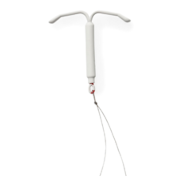But really, should you get an IUD right now?
If you’re among the many folks wondering if now is the time to try long-acting birth control, here are some things to consider.

“We have 5 more IUDs on the schedule today.” This has become a familiar refrain from the staff in my office over the last few months. I’m a gynecologist who primarily provides family planning services, but this scene is playing out in doctors’ offices around the country—and not just for those of us who focus on family planning. Health care providers are reporting an uptick in IUD insertions and interest in IUDs among young women has spiked. If it seems like everyone is either getting an IUD or talking about how awesome they are, and all the buzz has you wondering if an IUD is right for you, you’ve come to the right place.
So, what’s all the buzz about?
With ongoing discussion in Congress and the Trump Administration of repealing the Affordable Care Act (ACA, a.k.a. ObamaCare), lots of people worry that the change could affect their access to birth control. Currently under the ACA, all forms of birth control must be covered by health insurance plans without additional costs (like copays or deductibles). Before the ACA, the most effective and long-lasting reversible methods—IUDs and implants—cost so much upfront that many people without insurance couldn’t afford them. The cost ranged from $500-$1,000. Other methods, like birth control pills or the patch, could cost up to $75 per month.
Although the contraceptive coverage rule of the ACA is popular with the public, there’s no guarantee it will stick around under the new administration. With this in mind, many women are thinking about upgrading their current method to something that would provide them with long-term protection if the ACA is repealed or substantially changed. IUDs can last from 3 to 12 years, and they’ve been gaining in popularity in recent years, so they’re an appealing option for those who want to guarantee their birth control’s covered regardless of what happens with the ACA.
How do I know if an IUD is right for me?
The good news is that if you have a uterus, an IUD is probably an option for you! Of course, it’s important to talk with your provider about your unique medical history, but for the most part there are very few reasons why someone couldn’t use an IUD.
There are lots of really great things about them:
IUDs can last from 3-12 years, depending on the type—but you can get one removed by a health care provider anytime if you decide it’s not for you or want to get pregnant.
IUDs are very safe and most people who use them have very few side effects.
IUDs are super low-maintenance and highly effective. Think “set-it-and-forget-it” style birth control.
IUDs don’t affect your ability to get pregnant in the future. Most IUD users can get pregnant right away after their IUD is removed.
How do I get one?
The first step is to make an appointment with your provider to talk about your options. There are different kinds of IUDs. Some have hormones. Some last longer than others. Your provider can help you decide which one is right for you.
Will my insurance pay for it?
In general, if you have health insurance for 2017, getting an IUD (or another birth control method) should be fully covered. The ACA covers preventive health services without copays or deductibles, and birth control is currently considered a preventative health service.
What if I don’t have insurance? How much will an IUD cost?
Unfortunately, without insurance, IUDs can cost hundreds of dollars up front. Although that may sound like a lot of money (okay, it IS a lot of money!), it is actually cheaper in the long run. For example, if you decide to use birth control pills, most pills cost about $40 a pack. Each pack lasts one month. That will cost you $480 over one year of use, $960 if you use pills for 2 years, and so on. On the other hand, the longer you use an IUD, the more money you save on birth control. (BTW, depending on your income and where you live, you might qualify for free or low-cost birth control through public programs like the Title X family planning program or Medicaid.)
What else do I need to know?
There are a few more things it’s important to be aware of if you’re thinking about whether to get an IUD.
The implant is also an option. IUDs aren’t the only option if you’d like a method that is both low-maintenance and long-lasting. The birth control implant is a small rod that goes in your arm, is totally reversible, and can stay in place for up to 5 years. Like the IUD, the implant is safe and effective, with very few side effects.
IUDs aren’t for everyone. A one-size-fits-all approach doesn’t work with most things, and it definitely doesn’t work with birth control. The best thing to do, if you’re thinking about any method, is to talk with your health care provider and see whether this option is right for you.
Birth control needs change. For most people, finding the right birth control can be a process of trial and error. Plus, as our bodies and lives change over time, a method that used to be perfect for us might no longer be quite right. The good news is that, other than sterilization, all birth control methods are reversible, which means you can stop them at any time.
A few final thoughts…
Whether the birth control protections put in place by the ACA are weakened, eliminated, or preserved, some states are already taking steps to protect access. These states have realized that comprehensive protection for birth control is important regardless of what happens at the federal level. Unfortunately, many states haven’t put anything in place to protect no-cost coverage for the full range of methods if the ACA is changed or eliminated.
No one knows yet what will happen to contraceptive coverage and health insurance under the new administration, but a growing number of people have been expressing their support for the benefits the ACA provides. If you support access to affordable health care, including birth control coverage, one way to transform your support into action is to contact your elected officials and tell them where you stand. You can identify your representative in the House using this “Find Your Representative” tool and find your Senators here. Then call the Capitol switchboard at 202-224-3121 and ask them to connect you. This part can make some people nervous, but it’s a lot simpler than it sounds. You could say something like:
My name is [your name] and I am a constituent from [wherever you live].
I am calling to urge Representative/Senator [their name] to protect contraceptive coverage through the Affordable Care Act.
Every woman, regardless of income, should have affordable access to the birth control method that she and her health care provider decide is best.
Finally, whether IUDs are the right choice for you or not, one thing is for sure—they are not a substitute for access to health care. To truly stay on top of your sexual and reproductive health, you need to be able to see a health care provider and get the services you and that provider decide are right for you without breaking the bank. Unless people have access to providers and services, all of the talk about IUDs is just that—talk.
How do you feel about this article?

Heat up your weekends with our best sex tips and so much more.

